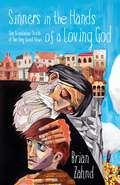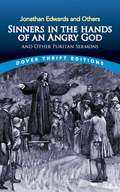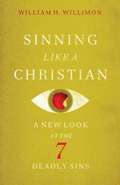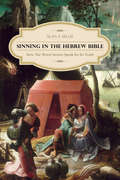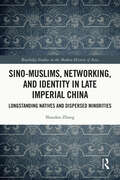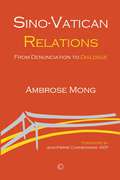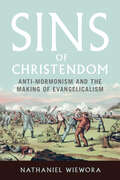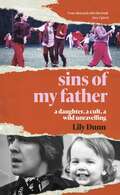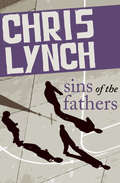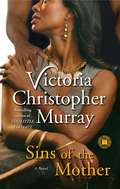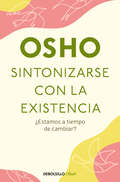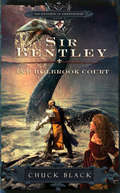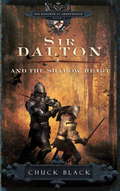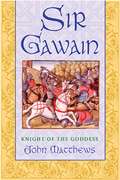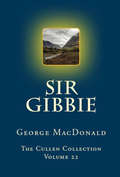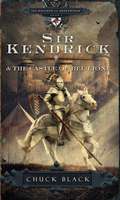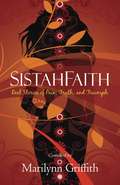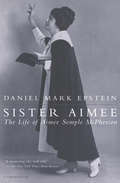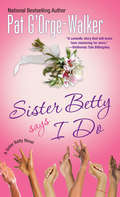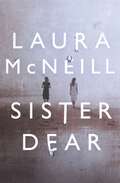- Table View
- List View
Sinners in the Hands of a Loving God: The Scandalous Truth of the Very Good News
by Brian Zahnd William Paul YoungGod is wrath? Or God is Love?In his famous sermon “Sinners in the Hands of an Angry God,” Puritan revivalist Jonathan Edwards shaped predominating American theology with a vision of God as angry, violent, and retributive. Three centuries later, Brian Zahnd was both mesmerized and terrified by Edwards’s wrathful God. Haunted by fear that crippled his relationship with God, Zahnd spent years praying for a divine experience of hell. What Zahnd experienced instead was the Father’s love—revealed perfectly through Jesus Christ—for all prodigal sons and daughters. In Sinners in the Hands of a Loving God, Zahnd asks important questions like: Is seeing God primarily as wrathful towards sinners true or biblical? Is fearing God a normal expected behavior? And where might the natural implications of this theological framework lead us? Thoughtfully wrestling with subjects like Old Testament genocide, the crucifixion of Jesus, eternal punishment in hell, and the final judgment in Revelation, Zanhd maintains that the summit of divine revelation for sinners is not God is wrath, but God is love.
Sinners in the Hands of an Angry God and Other Puritan Sermons (Dover Thrift Editions)
by Jonathan EdwardsA sermon preached by Jonathan Edwards to his Enfield, Connecticut, congregation in July 1741, "Sinners in the Hands of an Angry God" is particularly noted for its vivid descriptions of the torments of Hell and mankind's natural depravity. At the same time, it was also an appeal to man's need for salvation and a reminder of the agonies that awaited the unreformed. Coming during the height of the Great Awakening -- a period of religious fervor in the first half of the eighteenth century -- the homily was at once regarded by many as the greatest ever given on American soil and vehemently attacked by others as puritanical "fire and brimstone." One thing seems certain: it made a lasting impact on American Christianity.Accompanying this landmark document are sermons by nine other influential Puritans of the sixteenth to eighteenth centuries, among them Thomas Shepard's "The Parable of the Ten Virgins," Cotton Mather's "An Hortatory and Necessary Address," John Cotton's "The Way of Life," as well as sermons by John Winthrop, Increase Mather, Jonathan Mayhew, Thomas Hooker, Peter Bulkeley, and Samuel Willard.Enlightening and thought-provoking, the volume will serve as primary source material in many American history and literature courses.
Sinning Like a Christian: A New Look at the 7 Deadly Sins
by William H. WillimonThe seven deadly sins are a well-known topic, but, surprisingly, not much has been written about them in recent years from a serious theological viewpoint. Will Willimon's engaging book, which takes an unflinching look at the meaning and substance of sin, will be of great interest to Christians. Study questions by the author are included. The "felt need" is an increasing dissatisfaction with shallow, feel-good Christianity—which does not attempt to grapple with our propensity, visible around us and in our own lives, to do evil. This edition includes a new introduction by the author.
Sinning in the Hebrew Bible: How the Worst Stories Speak for Its Truth
by Alan F. SegalBozorth (Southern Methodist U. ) argues that British poet W. H. Auden's (1907-73) work embodies a process of homosexual self- interrogation that has few parallels in modernist literature. His preoccupation with the relationship between the private, the personal, and the political, he argues, reflected his negotiation of traditional constraints on gay, lesbian, and queer writers to speak publicly. c. Book News Inc.
Sinning in the Hebrew Bible: How the Worst Stories Speak for Its Truth
by Alan SegalStories of rape, murder, adultery, and conquest raise crucial issues in the Hebrew Bible, and their interpretation helps societies form their religious and moral beliefs. From the sacrifice of Isaac to the adultery of David, narratives of sin engender vivid analysis and debate, powering the myths that form the basis of the religious covenant, or the relationship between a people and their God. Rereading these stories in their different forms and varying contexts, Alan F. Segal demonstrates the significance of sinning throughout history and today. Drawing on literary and historical theory, as well as research in the social sciences, he explores the motivation for creating sin stories, their prevalence in the Hebrew Bible, and their possible meaning to Israelite readers and listeners. After introducing the basics of his approach and outlining several hermeneutical concepts, Segal conducts seven linked studies of specific narratives, using character and text to clarify problematic terms such as "myth," "typology," and "orality." Following the reappearance and reinterpretation of these narratives in later compositions, he proves their lasting power in the mythology of Israel and the encapsulation of universal, perennially relevant themes. Segal ultimately positions the Hebrew Bible as a foundational moral text and a history book, offering uncommon insights into the dating of biblical events and the intentions of biblical authors.
Sino-Muslims, Networking, and Identity in Late Imperial China: Longstanding Natives and Dispersed Minorities (Routledge Studies in the Modern History of Asia)
by Shaodan ZhangThis book explores the everyday life of Muslims in late imperial China proper (“Sino-Muslims”), revealing how they integrated themselves into Chinese society, while also maintaining distinct Islamic features. Deeming “identity” as practical, interactive, and processual, it focuses on Sino-Muslims’ daily networking practices which embodied their numerous processes of identification with people around them. Through an evaluation of such practices, it displays how, since the early seventeenth century, Sino-Muslims vigorously formed and participated in popular religious and secular networks at local, translocal, and China-wide scales, including mosques, merchant associations, gentry groups, Islamic educational and publishing networks. It demonstrates how such networks facilitated Sino-Muslims to become more aligned with the tempo of change in Chinese society and imperial governance, and created for them more ingenious venues and means to identify with Islam. Ultimately it reveals how, by the first half of the nineteenth century, a sense of collectivity—with common knowledge, memory, and discourse—was generated among dispersed Sino-Muslims. Utilizing Sino-Muslims’ own records such as steles, genealogies, and Chinese Islamic texts, this book will be of interest to scholars and students of comparative Muslim studies, Qing and early modern China, religious and ethnic identity, and professionals of Sino-Arab relations.
Sino-Vatican Relations: From Denunciation to Dialogue
by Ambrose MongFor those interested in Christianity in China, the state-church relationship, and the present Communist regime and its attitude towards religion, Sino-Vatican Relations offers a wealth of information and insights. This work traces the tortuous history of the relationship between the Chinese government and the Roman Catholic Church, from denunciation of Communism by the Church, to seeking dialogue by recent pontiffs such as John Paul II, Benedict XVI and Francis. Besides examining the religious policy of China since 1949 and how the Chinese government deals with religious revivals, this work also traces the history of the church regarding the appointment of bishops in Europe from its early days to modern times. Monarchies in Europe have always been involved in the appointment of bishops. Thus, the recent agreement between Pope Francis and the Chinese authorities regarding the appointment of bishops has historical precedents. The overall aim of this work is to help readers to get the right information needed to have a well-informed opinion on the complex matter of the Sino-Vatican Relations, particularly on the agreement signed by Pope Francis with Beijing in 2018.
Sins of Christendom: Anti-Mormonism and the Making of Evangelicalism
by Nathaniel WieworaEvangelical criticism of the Church of Jesus Christ of Latter-day Saints dates back to the earliest days of the Church. Nathaniel Wiewora uses the diverse animus expressed by evangelicals to illuminate how they used an imaginary Church as a proxy to disagree, attack, compromise, and settle differences among themselves. As Wiewora shows, the evangelical practice to contrast itself with the emerging faith not only encompassed but also went beyond religious matters. If Joseph Smith was accused of muddling religious truth, he and his followers also faced accusations of immoral economic practices and a sinful regard for wealth that reflected worries within the evangelical world. Attacks on Latter-day Saints’ emotional religious displays, the Book of Mormon’s authenticity, and the dangerous ideas represented by Nauvoo paralleled similar conflicts. Wiewora traces how the failure to blunt the Church’s success led evangelicals to change their own methods and pursue the religious education infrastructure that came to define parts of the movement.
Sins of My Father: A Daughter, a Cult, a Wild Unravelling
by Lily DunnWhen Lily Dunn was just six years old, her father left the family home to follow his guru to India, trading domestic life for clothes dyed in oranges and reds and the promise of enlightenment with the cult of Bhagwan Shree Rajneesh. Since then he has been a mystery to her. She grew up enthralled by the image of him; effervescent, ambitious and elusive, a writer, publisher and entrepreneur, a man who would appear with gifts from faraway places, and with whom she spent the long, hot summers of her teenage years in Italy, in the company of his wild and wealthy friends.Yet he was also a compulsive liar, a delinquent, a man who abandoned his responsibilities in a pursuit of transcendence that took him from sex addiction, via the Rajneesh cult, to a relentless chase of money, which ended in ruin and finally addiction to alcohol and prescription drugs.A detective story that charts two colliding narratives, Sins of My Father is a daughter's attempt to unravel the mysteries of a father who believed himself to be beyond reproach. A dazzling work of literary memoir, it asks how deep legacies of shame and trauma run, and if we can reconcile unconditional love with irreparable damage.
Sins of My Father: A Daughter, a Cult, a Wild Unravelling
by Lily DunnWhen Lily Dunn was just six years old, her father left the family home to follow his guru to India, trading domestic life for clothes dyed in oranges and reds and the promise of enlightenment with the cult of Bhagwan Shree Rajneesh. Since then he has been a mystery to her. She grew up enthralled by the image of him; effervescent, ambitious and elusive, a writer, publisher and entrepreneur, a man who would appear with gifts from faraway places, and with whom she spent the long, hot summers of her teenage years in Italy, in the company of his wild and wealthy friends.Yet he was also a compulsive liar, a delinquent, a man who abandoned his responsibilities in a pursuit of transcendence that took him from sex addiction, via the Rajneesh cult, to a relentless chase of money, which ended in ruin and finally addiction to alcohol and prescription drugs.A detective story that charts two colliding narratives, Sins of My Father is a daughter's attempt to unravel the mysteries of a father who believed himself to be beyond reproach. A dazzling work of literary memoir, it asks how deep legacies of shame and trauma run, and if we can reconcile unconditional love with irreparable damage.
Sins of the Fathers
by Chris LynchThree lifelong buddies struggle against the hold of their church leaders "Don't let me fall behind" is the spoken promise between best friends Drew, Skitz, and Hector. The three teens live in a blurred church-school environment at the mercy of three priests who have an ominous power over them and their families. Together, Drew, Skitz, and Hector can get through the cruelties and power games of Fathers "Blarney," "Mullarkey," and "Shenanigan," as the boys call them. Together, the boys can deal with any issue--until suspected abuse begins to threaten their bond of friendship. This ebook features an illustrated biography of Chris Lynch including rare images from the author's personal collection.
Sins of the Fathers
by Hilaire KallendorfSins of the Fathers considers sins as nodes of cultural anxiety and explores the tensions between competing organizational categories for moral thought and behaviours, namely the Seven Deadly Sins and the Ten Commandments. Hilaire Kallendorf explores the decline and rise of these organizational categories against critical transformations of the early modern period, such as the accession of Spain to a position of world dominance and the arrival of a new courtly culture to replace an old warrior ethos. This ground-breaking study is the first to consider Spanish Golden Age comedias as an archive of moral knowledge. Kallendorf has examined over 800 of these plays to illustrate how they provide insight into aspects of early modern experience such as food, sex, work, and money. Finally, Kallendorf engages the theoretical terminology of Marxist literary criticism to demonstrate the inherent ambiguity of cultural change.
Sins of the Mother
by Victoria Christopher MurrayHave the sins of the mother come upon the daughter?Jasmine Larson Bush is finally living a drama-free life. She’s left her lying, cheating, stealing stripper days behind and is standing by her husband’s side as the first lady of one of the largest churches in New York City. The Bushes have been blessed with the best of everything—including two lovely children. But just when Jasmine has committed her life completely to God, her daughter Jacqueline is kidnapped from a mall the day after Thanksgiving. The police and the church community join in the frantic search to find the four-year-old. As the days pass without any sign of her daughter, Jasmine begins to crack under the strain and turns to Brian Lewis, Jacqueline’s biological father, for solace. Has Jasmine’s past finally caught up to her? Will her daughter be found or will Jasmine pay the ultimate price?
Sins of the Mother
by Victoria Christopher MurrayHave the sins of the mother come upon the daughter?Jasmine Larson Bush is finally living a drama-free life. She's left her lying, cheating, stealing stripper days behind and is standing by her husband's side as the first lady of one of the largest churches in New York City. The Bushes have been blessed with the best of everything--including two lovely children. But just when Jasmine has committed her life completely to God, her daughter Jacqueline is kidnapped from a mall the day after Thanksgiving. The police and the church community join in the frantic search to find the four-year-old. As the days pass without any sign of her daughter, Jasmine begins to crack under the strain and turns to Brian Lewis, Jacqueline's biological father, for solace. Has Jasmine's past finally caught up to her? Will her daughter be found or will Jasmine pay the ultimate price?
Sintonizarse con la existencia: Una propuesta para un nuevo comienzo
by OshoUn libro imprescindible sobre la visión de Osho para promover el cambio que la humanidad necesita Las grandes ideas a las que se aferró la humanidad en el pasado -el matrimonio, el poder, la moral- han sido cuestionadas. Ante esta época de profundos cambios, Osho nos presenta sin embargo una visión positiva del ser humano y el futuro. Es momento de construir una sociedad nueva, que solo se logrará con un salto cuántico en la conciencia de los individuos. Este libro, en el que Osho se detiene en el despertar de la conciencia y las cualidades del hombre nuevo, además de dedicar una mirada renovada a cuestiones de siempre, como el amor, la familia o el dinero, es un compendio de las claves fundamentales de la propuesta del gran maestro del siglo XXI para una nueva humanidad y un acercamiento valioso a su poderosa visión de una sociedad de seres humanos amorosos, conscientes y verdaderamente libres a través dela meditación. «No hay necesidad de cambiar el mundo, basta que cambies tú y el mundo comenzará a cambiar.» OSHO
Sir Bentley And Holbrook Court
by Chuck BlackThe People of Holbrook are suffering under the rule of the greedy Lord Kingsley. Will greed destroy the kingdom the way it destroyed Lord Kingsley? Sir Bentley, an honorable young knight, abandons his calling in order to seek the truth of the Prince. Choosing to live as the Prince did, he forsakes his former lifestyle and wealth to live as a pauper. His travels take him to Holbrook, where the townsfolk live in poverty, paying high taxes to support the lavish lifestyle of Lord Kingsley and his court. But something even darker is lurking in the shadows of the beautiful castle. Bentley soon befriends Eirwyn, a mysterious but compassionate young woman who often distributes food among the poor. When Eirwyn is kidnapped by a ruthless tribe to serve as a sacrifice, Bentley battles a vicious mountain creature to save her life. But when he discovers who is really behind Holbrook’s downfall, he’s faced with an even bigger challenge—battling the Dark Knight’s most evil commander and his Shadow Warriors as they attack the castle. Can Sir Bentley and Eirwyn work together to restore order and prosperity to the kingdom through the compassion and grace of the Prince?
Sir Dalton and The Shadow Heart (The Knights of Arrethtrae #3)
by Chuck BlackSir Dalton, a knight in training, seems to have everything going for him. Young, well-liked, and a natural leader, he has earned the respect and admiration of his fellow knights, and especially the beautiful Lady Brynn. But something is amiss at the training camp. Their new trainer is popular but lacks the passion to inspire them to true service to the King and the Prince. Besides this, the knights are too busy enjoying a season of good times to be concerned with a disturbing report that many of their fellow Knights have mysteriously vanished. When Sir Dalton is sent on a mission, he encounters strange attacks, especially when he is alone. As his commitment wanes, the attacks grow in intensity until he is captured by Lord Drox, a massive Shadow Warrior. Bruised and beaten, Dalton refuses to submit to evil and initiates a daring escape with only one of two outcomes–life or death. But what will become of the hundreds of knights he’ll leave behind? In a kingdom of peril, Dalton thinks he is on his own, but two faithful friends have not abandoned him, and neither has a strange old hermit who seems to know much about the Prince. But can Dalton face the evil Shadow Warrior again and survive? From the Trade Paperback edition.
Sir Gawain: Knight of the Goddess
by John MatthewsRestores Gawain of Camelot to his true role as the foremost representative and servant of the Goddess.• The full story of Gawain of Camelot that restores a lost piece of the great Arthurian tapestry.• Traces the historical trends that demoted Gawain from the foremost knight of the Round Table to a villain and womanizer. • The result of more than 20 years of research by one of the world's leading scholars of Arthurian mythology.Sir Gawain, the nephew of King Arthur, was once the most important knight at Arthur's court, a shining example of all that was best in chivalry. He even outranked the famous Lancelot. Yet as the popularity of the Arthurian romances grew, the character of Gawain became increasingly diminished in popular literature. John Matthews explores the phenomenon that influenced the recasting of Gawain from hero to womanizing villain, providing a scholarly context through which Gawain's role as the representative of the Goddess upon Earth--the real Green Knight of Camelot and Sovereignty's Champion--may be restored. In addition, the author presents a unique view of the mythology of Britain and its connections with the historical changes that took place over many hundreds of years in the religious and mystical traditions of the country.
Sir Gibbie: A Novel; Volume 1 (The Cullen Collection #22)
by George MacDonaldThe acclaimed tale of a mute orphan with an angel&’s heart. &“The most direct and most beautiful of all George MacDonald&’s novels.&”—Greville MacDonald, author of George MacDonald and His Wife One of the true high marks in George MacDonald&’s literary career was reached with the publication in 1879 of Sir Gibbie. Every MacDonald reader has his or her favorite, but it is safe to say that Sir Gibbie is near the top of the list for lovers of fairy tale, poetry, and novels alike. The character of &“wee Sir Gibbie&” mysteriously embodies hints from the land of &“faerie,&” and his soul is poetry personified. MacDonald&’s storytelling genius here rises to heights as soaring as the mountain of Glashgar in the Scottish Highlands where Gibbie roams barefoot with the sheep, amid earthquake and flood. It was this book that captured author Elizabeth Yates&’ imagination and prompted her 1963 edition of Sir Gibbie, which in turn led to Michael Phillips&’s updated editions that inaugurated the MacDonald renaissance of the 1980s. If one could choose but one MacDonald novel to read, many would say it should be Sir Gibbie. Following Elizabeth Yates&’ example, Michael Phillips again translates the difficult Doric dialect of MacDonald&’s original into more accessible English.
Sir Kendrick and the Castle of Bel Lione (The Knights of Arrethtrae #1)
by Chuck BlackA dangerous new order threatens the mission of the Knights of Arrethtrae. Only loyalty to the King can bring victory!As the Knights of the Prince await His triumphant return, they are steadfast in their mission to take His story into the kingdom and recruit as many as are willing. But when a new and dangerous threat is revealed, their mission is jeopardized. Sir Kendrick and his young charge, the impetuous Sir Duncan, are sent on a mission to discover the identity and origin of a secretive new order known as the Conquistero Knights. They travel to the city of Bel Lione where Lord Ra has been enticing young people in the kingdom to join his festivals, after which many choose not to return home. Their families keep quiet for fear of repercussion. When Sir Duncan disappears while trying to discover the truth of Lord Ra’s castle, Sir Kendrick attempts to find and enlist the help of a mysterious warrior. Time is short for he must save Duncan and call upon the knights of Chessington to join in the battle against the evil Lord Ra. Journey to Arrethtrae, where these knights of noble heart live and die in loyal service to the King and the Prince. These knights are mighty, for they serve a mighty King. They are…the Knights of Arrethtrae!From the Trade Paperback edition.
Sista Talk Too
by Rochelle BrockIn Sista Talk Too, Rochelle Brock brings meaningful new material which evokes and updates her past examination of Black women in today’s culture. The first Sista Talk: The Personal and the Pedagogical is an inquiry into the questions of how Black women define their existence in a society which devalues, dehumanizes, and silences their beliefs. Placing herself inside of the research, Rochelle Brock invited the reader on a journey of self-exploration, as she and seven of her Black female students investigate their collective journey toward self-awareness in the attempt to liberate their minds and souls from ideological domination. Throughout, Sista Talk attempted to understand the ways in which this self-exploration informs her pedagogy. Combining Black feminist and Afrocentric theory with critical pedagogy, Sista Talk Too frames the parameters for an Afrowomanist pedagogy of wholeness for teaching Black students and strength in dealing with an unpredictable and often unstable view of the future. Rochelle Brock brings us something to be remembered by, chapters and writings from students and colleagues to help us survive and thrive in this world…all in the spirit of love, life, and Oshun.
SistahFaith
by Marilynn GriffithAshamed No More Every woman needs a safe place to bleed...a quiet place to scream, and friends to dress her wounds. She needs the support of sistahs who won't cringe at the honest truth, who are willing to walk by her side, who will listen to her stories, and who will offer balm to heal her wounds. This collection of poignant, true stories honestly reflects the humiliation that countless women experience every day at the hands of people who are supposed to love them. Drawing from the biblical story of Tamar, who was raped and disgraced by her own brother, spiritual truths of hope, healing, and new beginnings are highlighted in every story. Among the women who have shared their stories of truth and triumph are Bonnie DeBarge of the famed Motown group the DeBarges, award-winning novelist Sharon Ewell Foster, and author Claudia Mair Burney. Most women endure in silence -- afraid to tell the truth, held captive by their disgrace. But here, in these pages, they have told the truth, they have lifted their skirts to show their scars, and most important of all -- they have found redemption, hope, and new life. Your Own SistahFaith Circle: In addition to sharing beautifully written stories and poems, this book shows you how to gather your own group of sistahs, and each chapter includes discussion questions that will help your gathering of sistahs journey past the shame, beyond rejection, and straight to the heart of God.
Sister Aimee: The Life of Aimee Semple McPherson (Harvest Book Ser.)
by Daniel Mark EpsteinThe true story of America&’s first superstar evangelist that &“fills a significant gap in the history of revivalism&” (The New York Times Book Review). Once she answered the divine calling, Aimee Semple McPherson rose fast from unfulfilled housewife in Rhode Island to &“miracle woman&”—the most enigmatic, pioneering, media-savvy Christian evangelist in the country. She preached up and down the United States, traveling in a 1912 Packard with her mother and her children—and without a man to fix flat tires. Her ministry was rolled out in tents, concert halls, boxing rings, and speakeasies. She prayed for the healing of hundreds of thousands of people, founded the Foursquare Church, and built a Pentecostal temple in Los Angeles of Hollywood-epic dimensions (Charlie Chaplin advised her on sets). But this is not just a story of McPherson&’s cult of fame. It&’s also the story about its price: exhaustion, insomnia, nervous breakdowns, sexual scandals, loneliness, and the notorious public disgrace that nearly destroyed her. A &“powerhouse biography of perhaps the most charismatic and controversial woman in modern religious history,&” Sister Aimee is, above all, the life story of a unique woman, of the power of passion that rejects compromise, and a faith that would not be shaken (Kirkus Reviews). &“[Told] with insight, empathy and lyrical power . . . Daniel Mark Epstein sees the facts, and feels the mystery, and he has written a remarkable book.&” —Los Angeles Times
Sister Betty Says I Do (A\sister Betty Novel Ser.)
by Pat G'Orge-Walker“A comedic story that will leave fans clamoring for more.” —ReShonda Tate BillingsleyAn inspiring, devilishly funny tale of hope, secrets—and hard-knock faith that can make the most impossible situations right…For Sister Betty, the marriage proposal from trustee Freddie Noel is a once-in-a-lifetime surprise blessing. Unfortunately, she knows the chances of having a peaceful ceremony in their beloved Crossing Over Sanctuary Church are slim to none. But she’s armed with enough sense and scripture to keep contentious church busybodies from sowing even more chaos amid the congregation—until a rehearsal disaster and an unexpected secret causes Freddie to break off the engagement without explanation…While this no-nonsense prayer warrior needs all the holy backup she can get, her pastor, Reverend Leotis Tom, is desperately dodging temptation as two women compete to become his First Lady. With her happiness, the church’s future, and Tom’s sanity on the line, Sister Betty will need to kick some spiritual butt, take names—and fight for some major soul-saving miracles.“A wonderful romp that will have wide appeal to both sinners and saints.” —Library Journal“Walker shines…with her usual inspirational, knee-slapping style.” —Publishers Weekly on Don’t Blame the Devil
Sister Dear
by Laura McneillAll Allie Marshall wants is a fresh start. But when dark secrets refuse to stay buried, will her chance at a new life be shattered forever? Convicted of a crime she didn't commit, Allie watched a decade of her life vanish - time that can never be recovered. Now, out on parole, Allie is determined to clear her name, rebuild her life, and reconnect with the daughter she barely knows. But Allie's return home shatters the quaint, coastal community of Brunswick, Georgia. Even her own daughter Caroline, now a teenager, bristles at Allie's claims of innocence. Refusing defeat, a stronger, smarter Allie launches a battle for the truth, digging deeply into the past even if it threatens her parole status, personal safety, and the already-fragile bond with family. As her commitment to finding the truth intensifies, what Allie ultimately uncovers is far worse than she imagined. Her own sister has been hiding a dark secret--one that holds the key to Allie's freedom.
